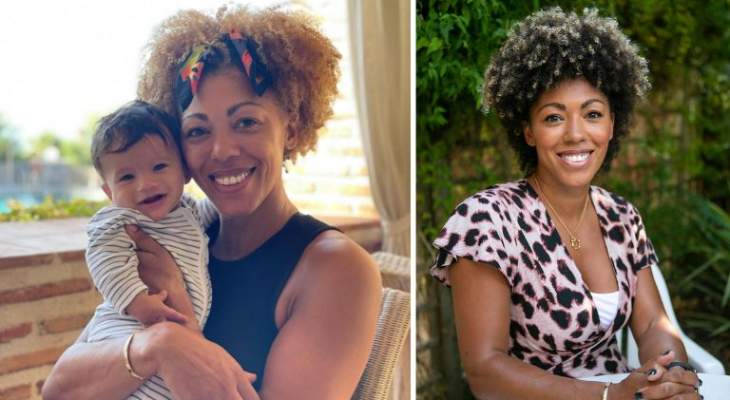- Home
- -
- Mother & Baby
- -
- Insights from Dr Zoe Williams: 7 Lessons Learned on the Journey of Motherhood, as Shared on This Morning
Insights from Dr Zoe Williams: 7 Lessons Learned on the Journey of Motherhood, as Shared on This Morning

Has having a child completely changed your life? Healthista interviewed ITV’s This Morning resident doctor Dr Zoe Williams about what she has learned since becoming a parent
The joy of welcoming a new baby is shared by all parents. However, learning how to navigate motherhood comes with many challenges.
A study conducted by premium children’s brand Stokke found that nearly a quarter (24%) of new parents are not confident in their parenting skills.
The survey found that 84 percent of parents were shocked at the changes in their lives and 22 percent struggled with a lack of confidence about their parenting skills. It was the mothers who felt the most parental guilt.

Nearly a quarter (25%) of new parents are not confident in their parenting skills
Healthista spoke with Dr Zoe Williams (41), resident doctor on ITV’s This Morning. She gave birth to Lisbon Lion Williams McKay, her son, in May 2021.
Dr Zoe Williams is a TV personality and NHS general practitioner. She says, “Becoming a first-time parent can be both wonderful and overwhelming.”
What Dr Zoe Williams has to say about motherhood, and what she’s learned since Lisbon joined her world.
#1 Sleep deprivation is inevitable
The survey found that parents are frustrated by a lack sleep when they bring a baby home. Not surprisingly, 62 percent of respondents said this was their greatest frustration.
When you are a new mother, you don’t sleep well. It’s because your maternal instinct is always on high alert, says Dr Williams.
This maternal instinct tells me that it is my job to ensure the safety and health of the baby at and all time.
It’s best to give this responsibility to someone else, even if only for an evening per week.
It can make a huge difference in your mood and well-being if you are able to turn off the maternal part of your mind and sleep for one night.
Your new maternal instinct keeps you constantly alert
Stuart and I developed a weekend routine in which I would feed the baby at 5:30am, and then go to sleep in the spare bedroom. Stuart was then able to take over and I could sleep in the spare room until 10am.
“I’ve worked as a junior physician in hospitals and I know how distressing it can be to experience the symptoms of fatigue and sleep deprivation.
You may experience hallucinations and have difficulty with simple tasks such as tying shoelaces.
“Not only are you a new mom, but your hormones will change, and you’ll experience new emotions, as well as your body trying hard to adjust.
It’s reassuring to know that your feelings are due to lack sleep and other circumstances beyond your control.
You no longer own your time
The survey revealed that parents also experience other frustrations when they have a baby. From never being able to get anything done to not having enough time to shower or go to the bathroom.
Dr Williams reveals, “I used to shower every day but I don’t really have time for it anymore.”
‘I used to sleep more than four hours in a row and would decide to go somewhere, do something and then do it. I don’t have the time or ability to do that anymore.
I don’t really have time to shower right now
“I miss my carefree old life sometimes, but I wouldn’t ever swap it for my current life because I’ve also seen many positive changes.
“Stuart is a wonderful dad and he’s taken the responsibility of looking after me. He makes sure that I take care of myself and gives me the time to relax.
“As a mum, it is your responsibility to care for your child as the primary caregiver. But it is everyone else’s duty to take care of the mum.”
The third thing you’ll learn is patience and perspective
Dr Williams explains, “Since I became a mother, one of the most important things I’ve noticed is that I’ve learned to let go.”
“Stuart and me never used to argue a lot, but since we have a child in the home I don’t raise my voice at all and have learned to let things go that aren’t important.
Now that I have a baby at home, I don’t raise my voice.
“I have also been able to remain calm and composed, and I am now more patient and tolerant.
Lisbon was my first child and before that, I suffered from anxiety. I thought that after having a baby, it would get worse, but the anxiety has improved and now I experience a new type of anxiety that I think about as exciting, rather than scary, and this has helped me to put old anxiety in perspective.
4 Relationships can change
Dr Williams says, “I have to put in extra effort to maintain certain friendships, especially with friends who are single.”
This is because you won’t be doing certain things anymore, such as partying on Friday nights. If you’ve got friends with whom your relationship is built on going out to party, you need to find new ways to keep in touch.
It’s like joining a club once you become a mother or father. You automatically develop a deeper bond with those friends.
#5 Don’t adapt the baby to your lifestyle, but rather your life to your baby.
You will adapt to a new baby’s arrival in your life. But it is important that your baby fits in with your previous life.
‘There is a saying which always stays in my head, ‘when a baby is born there’s a new individual born within the mother,” says Dr Williams.
Both mother and child are in equal need of love, nourishment, and care. Because you become a different person overnight, it requires effort and work to hold on to certain aspects of your former identity, particularly in the first weeks and months.
It’s important to ensure that your baby can eventually fit into your life.
It’s inevitable that the life of a parent will change when a baby is born. But instead of changing everything for your child, think about the things you did in the past and how you could continue doing them and introduce your baby to those activities.
When Lisbon was six months away, I went back to the weight room and started lifting weights. This helped me feel mentally and physically strong.
“Another thing I did that helped was to continue working. Although it’s not for everyone, this helps me maintain my identity.”
Asking for assistance is a normal thing to do
A survey revealed that 71% of parents were reluctant to ask for assistance in the first few weeks after bringing their child home.
More than 40% did not want other people to think that they couldn’t handle things if they asked for help.
Dr Williams says that ‘this constant pressure to appear like you have it all together, and are doing well, or else there is an element of failure, says a great deal about the society today’.
Even for those who are confident about their abilities, they will find that their confidence is shaken by a variety of factors beyond their control.
‘I felt a lot of pressure myself, particularly as an older mother and GP. I wanted to make people think that I was in great shape and had everything under control. I appreciated the help. I was okay most of the time but not every day.
It can be hard to explain what you need.
The exception is the person who feels confident in bringing a newborn home within the first few weeks. However confident you are, don’t forget that there is help available to make life easier.
Most people have someone who is willing to assist them, whether it’s their parent, relative or friend.
People are usually very eager to help, but it is sometimes difficult to explain what you need. Don’t worry about asking for specific help.
Visitors will often want to hold your baby. But what you really need is someone to clean up the bathroom, put out the garbage, or pick up a few things from the store.
It may be hard to ask for help when you are in the middle of chaos, but I would advise you to plan ahead and decide how you want people to assist you. You can post a list of tasks that people can perform to help.
You may be overwhelmed by the expectations of motherhood.
Dr Williams describes how a pregnant woman feels a new, overwhelming emotion of love.
“But I honestly didn’t feel that overwhelming love right away. Other people have also said the same.
There’s so much happening when you’re giving birth. My primal instinct to protect Lisbon overtook all my feelings of affection the moment she was born.
“This was followed by feelings anxiety and this enormous responsibility felt bigger than I ever had. You can’t avoid feeling the pressure because this tiny baby is totally dependent on me.









